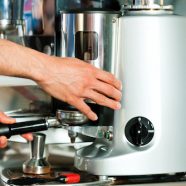Keep Vital Machinery Running for Optimum Production
What constitutes vital machinery in your business will be different from anyone else’s, but it generally falls under at least one of two rules. Losing it makes running your business difficult or impossible, and losing it can create a significant financial loss. Depending on your industry, your vital machinery may be:
- Walk-in refrigerators and freezers in a restaurant
- POS registers in a store
- Medical equipment in a nursing home, clinic or hospital setting
- Computers in an office
- Espresso machines in a coffee shop
What constitutes a vital piece of electrical equipment in one setting can be a luxury in another, and only you know what’s on your list. The important thing is to keep your vital machinery running, with no shutdowns for emergencies. The more types of electrical protection you have, the better the odds that you can keep your business open.
Possible Electrical Problems
Power outages are a larger problem here in south Florida than in many other regions of the country. Our weather is a big contributor to loss of power, causing thousands of micro-outages each year. Every time your power blinks, there’s the possibility of damage being done. Storms aren’t the only reason for the power to go out. Damage from traffic accidents or construction site mishaps can cut power for a long time, while older city wiring can tire out before being replaced.
Even if the power is steadily feeding into your building, you can still have a problem with your supply. Every building is wired based on its average expected use. The wiring in your building is rated for what’s expected on an average day. If your power usage increases dramatically for any reason, it can overload the system. Your circuit breaker will shut down the power to the part of the building that’s overloading it.
Forms of Electrical Protection
The most common reason for vital machinery going down is loss of electrical power. In south Florida we’re subject to more lightning strikes than any other state in the country, plus problems with tropical storms, hurricanes and an aging infrastructure. All this adds up to thousands of commercial electrical south Florida business owners with blackouts that may happen at any time.
The problem here isn’t usually the loss of power; most power outages last only seconds. The trouble happens when the power suddenly comes back on, surging through the system. This power surge can burn out computers and fry circuits in any number of crucial machines in your place of business. Your best protection against this is to have your electrician install surge control devices in your building. A surge controller is a buffer against a sudden sharp spike in electrical power, allowing the machinery to turn back on without the damaging effects of the spike. Some surge protectors even have short-term power supplies, allowing your machines to stay on for five to thirty minutes. This gives you enough time to turn your machinery off, eliminating the danger from power surges.
Even if the city power stays on, you can still have a problem by overloading the system. If your vital machinery is located in one central area of the building, such as a group of computers in one office, it’s smart to have your electrician install a dedicated circuit to that one area of your business. Having important machinery on a separate and dedicated circuit means it won’t be affected if a breaker goes off in a different part of the building. It’s another layer of protection, designed to wall off the most crucial machinery from lesser machines such as coffee makers and lamps.
Maintenance Agreements Can Make All the Difference
The smartest form of electrical protection is setting up a maintenance agreement with your electrical contractor. Every piece of electrical equipment, from your circuit breakers to intricate medical machinery, has maintenance needs and schedules. Following those schedules will reduce or eliminate emergency repair calls due to key machinery breaking down. If a machine is in poor repair, it’s more likely to suffer major damage if it goes through a power spike or outage. Your licensed electrician will replace frequently-worn parts before they need changing, as well as inspecting your equipment to look for potential problems that can come up in the future. Prevention is always smarter than repair, and it’s generally much more cost-effective for your business, too.
Read MoreAre You Considering a Standby Generator Installation This Hurricane Season?
Florida homes and businesses play the odds each year, hoping this one isn’t the year that a big hurricane finally makes its way onshore. Forecasters at NOAA are predicting that the 2016 hurricane season will be the worst one since 2012, when Hurricane Sandy did so much damage further up the coast into New England. We got lucky with Sandy in south Florida, but the odds are getting better every year that a big one will hit our coast and do serious damage to the infrastructure.
Even if your home is slightly away from the beach and flooding isn’t a big danger for you, power outages can happen, leaving residents without electricity for days. Your best defense against this happening is a standby generator. This type of backup power supply is a lot like homeowner’s insurance: you hope you never have to use it, but you keep it around because it’s invaluable when you do.
The Importance of a Standby Generator
Losing your power for a matter of minutes or hours is an annoying inconvenience, but during a hurricane a power outage is more likely to last for days. The impact on families can range from financial to real physical danger. Some of the problems that arise during an outage can be:
- Loss of money because of refrigerated and frozen food spoilage
- Loss of income for people who work at home using a computer
- Increased stress on family members from children not used to living without electronic devices
- Health hazards to those who need medical devices such as nebulizers or CPAP machines
- Environmental impact as extra spoiled food is added to landfills and sewer lines
Even something as simple as charging phones and tablets can be impossible during a power outage, and might be key in keeping in contact with family members in other endangered areas. For comfort, financial reasons and even physical safety, it’s important to seriously consider a standby generator if you live anywhere in southern Florida.
What Type of Power Outage Protection Do You Need?
The simplest form of backup power protection is a portable generator. Small and light enough for one person to move, these machines are effective in powering almost everything you need to keep yourself comfortable during a power outage. The size of the generator you need depends on what you want to run. The least expensive versions are enough to keep on a few lights, make sure the refrigerator and freezer are still running, keep you cool with a fan or two and make sure your electronic devices are powered up. More heavy duty versions are powerful enough to run central air conditioning, keep your whole house lit and make sure your desktop work space is running like normal. They’ll also power critical systems like home security and sump pumps.
A whole home generator is a more permanent type of power outage protection. They’re built in as a part of your home’s electrical system, and powered by a fuel such as natural gas. These generators are fixed in place, usually behind the house, and are usually a planned-for part of the original home building plans. Depending on the size of your generator, you can live through a power outage and never have it affect you in your daily life.
Portable vs. Whole Home Generators
Which type of generator do you need for hurricane protection? Both have their advantages and disadvantages. Portable versions are much less expensive, need no professional installation and can be fueled with ordinary gasoline much like a lawnmower. They can be stored away as needed instead of sitting out and taking up part of the landscaping.
Whole home generators, on the other hand, are a set-it-and-forget-it solution. Once you have the generator installed into your home system and with a fuel line attached, it will automatically kick on any time the power turns off for more than a few seconds. You’ll never have to worry about food spoilage or long outages. Plus, since they run on fuel that’s always available, they’re more reliable than portable versions. When the power’s out, you may not be able to get more gasoline for your portable generator.
Portable backup power supplies are useful for the short term, but when it comes to serious hurricane protection, your best choice is almost always a whole home generator.
Read More


Recent Comments